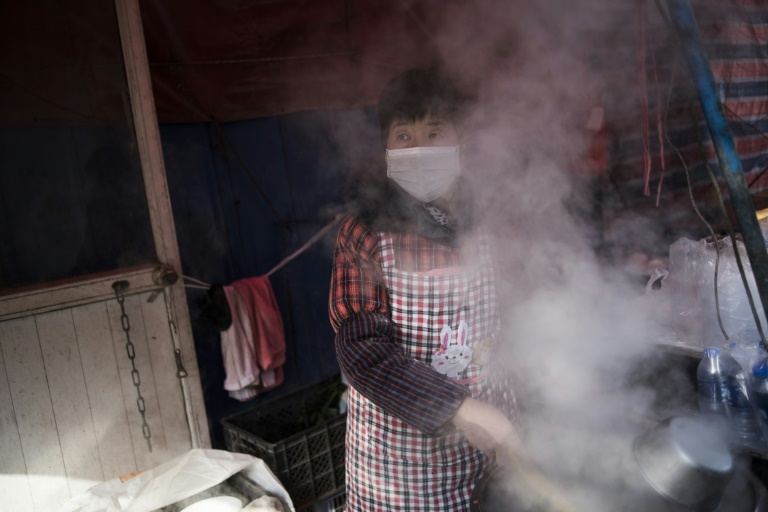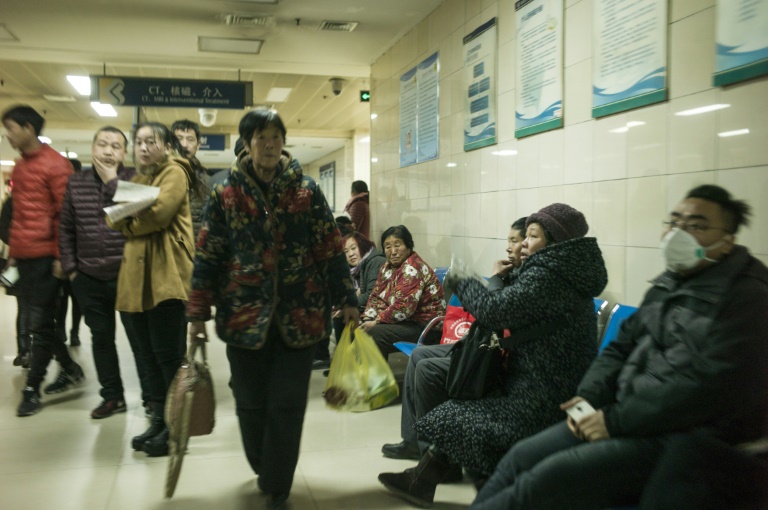With temperatures dipping below freezing in a northern Chinese village, a group of parka-clad women tried to stay warm as they played mahjong around a small gas stove in a grocery store.

Many in China have been shivering more than usual this winter as authorities have curbed coal heating to fight pollution and the switch to natural gas has been plagued by shortages.
In northern Hebei province, even a hospital and schools have struggled to heat their frigid facilities, prompting some teachers to hold classes outdoors in the sunshine.
“Of course we miss the coal,” said a woman surnamed Qin, who had invited neighbours into her grocery store in Niezhuang village — about 150 kilometres (93 miles) south of Beijing — to play mahjong, a traditional Chinese game.
Gas power is “completely unpredictable,” Qin said. “One moment we have it, the next moment there’s none. And then it’s freezing.”
The environment ministry has imposed tough anti-pollution targets on 28 cities around Beijing. At least three million homes must switch from coal to gas or electric heating.
In Niezhuang, all the coal stoves have been destroyed, according to Qin. Some of their dismantled pieces lay scattered in people’s backyards.
“Coal was nice because it allowed us to stay warm and save money,” the store owner said.
Sales of the fossil fuel traditionally used in the Chinese countryside was banned in this district of Hebei in the summer.
Niezhuang is part of the Baoding municipality, one of 18 districts in Hebei with a “zero coal” designation, but the transition to gas has been difficult.
Thin yellow pipes now snake along the walls of the homes in the village, spanning alleyways and shifting in the wind. They are marked by a sign: “Caution: Gas Pipes.”
The gas pipes came into operation in November.
The heating is inconsistent, villagers said, and the bills costly. According to Qin, a family must spend at least 5,000 yuan ($750) over the winter — compared with 2,000 yuan ($300) for coal — not including the subsidised price of the gas heater that must be purchased.
– ‘Incredibly dirty’ –
In some villages to the north of Baoding, households were cut off from coal without even being connected to gas heating, Caixin magazine reported.

Officials have been under pressure to deliver results in the fight against smog, which has become a health hazard across swathes of China
“There was a clear lack of communication and planning,” Greenpeace energy campaigner Huang Wei told AFP, noting that authorities had months to prepare for the winter.
One local government waited until October, right before the cold weather started, to begin the bidding process for the installation of a gas pipeline, Huang said.
Officials have been under pressure to deliver results in the fight against smog, which has become a health hazard across swathes of China.
“The year-end evaluation of many local officials is now closely related to the environment and air quality. So this year, the coal-to-gas (policy) has been carried out more intensely,” IHS Market analyst Zhou Xizhou said.
In Baoding, long one of the most polluted industrial cities in the country, a resident surnamed Wang beamed up at the blue sky and said he did not miss the coal.
“It was incredibly dirty and polluting,” he said from the courtyard of his home where has been receiving gas since last year.
– ‘Ice boxes’ –
But the surge in gas demand has challenged suppliers.
On November 28, Hebei warned that up to 20 percent of its gas needs were not met and that supply was being rationed.

Even a hospital and schools have struggled to heat their frigid facilities
In Wang’s neighbourhood, residential complexes and the Hebei University-affiliated hospital went virtually unheated.
The hospital, which serves 3,000 patients, received only about 13 percent of the gas needed to function, the facility said.
The university faced a similar situation, as dormitories were transformed into “ice boxes” for two weeks, one student said.
Schools in Baoding’s suburbs were also left without heating as they lacked an alternative to coal burners.
In response to the uproar, the environment ministry reauthorised coal in areas not equipped with alternative heating in early December.
But more challenges loom with Chinese gas terminals saturated, hindering imports as the country’s storage capacity is limited, said Zhou, the analyst.
“It’s hard for the system to manage seasonal peaks,” Zhou said.
Meanwhile people like Sun, a farmer in Hebei, are left with gas bills that are three times higher than coal, making it “unbearable for ordinary folks”.
Even in the name of blue skies, Sun said, “sacrifice is difficult”.
Support Local Journalism
Add The Citizen as a Preferred Source on Google and follow us on Google News to see more of our trusted reporting in Google News and Top Stories.






